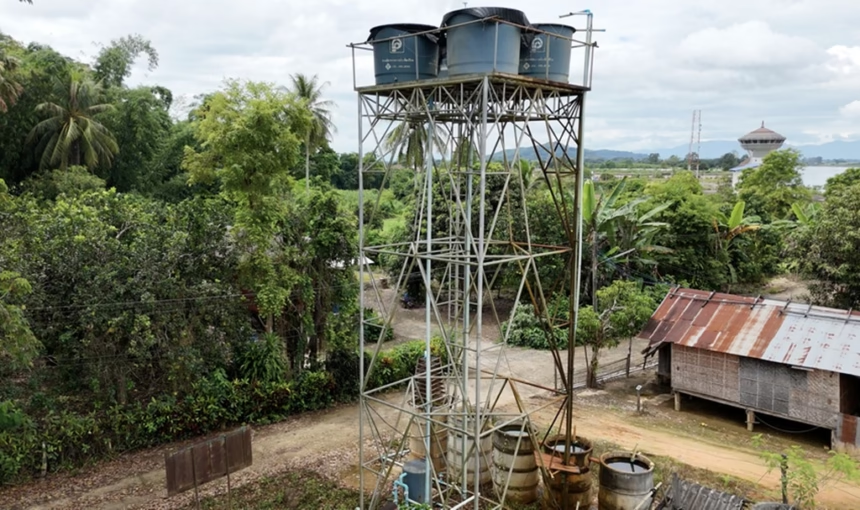CHIANG RAI – The Provincial Administrative Organization has acknowledged that urgent action is needed on contaminated tap water in 18 villages. Admitting village systems fall short of standards, plans upgrades, and wider checks by the Pollution Control Department.
On Saturday, Atitathorn Wanchaitanawong, President of the Chiang Rai Provincial Administrative Organization (PAO), discussed test results from the Medical Sciences Centre, Chiang Rai, under the Ministry of Public Health.
The agency found heavy metal contamination in tap water across 18 villages. She said most surveyed communities run non-standard village water systems. Tests of raw water before treatment showed that most samples did not exceed heavy metal limits.
She said joint checks with the Ministry of Higher Education, Science, Research and Innovation found high iron levels and some contaminants in many village systems. Some schemes use alum and chlorine, but these are used sparingly. People dislike the chlorine smell, so operators often add too little. Contamination tends to rise with turbidity, and low dosing leaves the water less safe.
Lead in Drinking Water
The Provincial Administrative Organization will build two or three pilot sites with the ministry as model systems for standard village water supply. Asked about the 18 sites with lead detected, Atitathorn said officials are briefing communities that contamination is linked to turbidity.
Settling solids and boosting pressure can help, and some steps can be done locally where systems exist. The PAO is distributing turbidity meters. For heavy metals, the Provincial Administrative Organization is working with the Provincial Public Health Office on river testing.
She raised concerns with the Ministry of Public Health, stressing that Chiang Rai sits downstream. The upstream risk is the Earth mining operation across the border in Myanmar. She has proposed to Deputy Prime Minister Capt. Thammanat Prompao, who visited the area, said that the government should address upstream control and engage the operator on waste management in the Kok River headwaters.
Atitathorn said local authorities need to review each village water system and see if it can be improved. Many fixes cost only tens of thousands of baht and can lift performance, especially sedimentation. She also wants a drive to cut the use of farm chemicals that run into soil and waterways.
On reports of contamination in farm produce, especially the main-season rice now nearing harvest, she said growers are more worried about prices. The Department of Agriculture should inspect and survey. She will ask for testing along the entire river system, since the impact would likely be similar along the flow. If widespread contamination is confirmed, the government must take responsibility.
Chiang Rai Wellness Destination
Chiang Rai has suffered this year. The province has set a goal to be a wellness destination, yet it has faced PM2.5 haze, floods, and now toxins in water. The damage to tourism and agriculture is significant. There needs to be a push to keep visitors coming while fixing the root issues. Current pollutant levels must fall. The government must assess what is happening at the upstream mine.
The Pollution Control Department (PCD) released a statement quoting Director-General Surin Warakitthamrong. He has ordered urgent checks on the village tap water where contamination is suspected. If arsenic or other heavy metals are found, authorities must act quickly and identify new, safe water sources for daily use.
Surin said that on 17 October 2025, the PCD, together with the Department of Groundwater Resources, the Chiang Rai Natural Resources and Environment Office, Mae Yao Municipality, village leaders, and residents, inspected two village systems in Mae Yao Subdistrict, Mueang Chiang Rai District.
The systems were the Karen Ruam Mitr Village water supply in Moo 2, which uses a mountain-fed system, and Ban Huai Sai Khao in Moo 3, which treats groundwater from a borehole. Field test kits detected no arsenic in either system. Water samples were sent to the PCD laboratory for further analysis of other heavy metals.
The PCD plans to complete inspections at all 18 reported sites next week. These include areas in Mae Yao, Doi Hang, Robwiang, and Rim Kok in Mueang Chiang Rai District; Wiang Nuea in Wiang Chai District; Dong Mahawan in Wiang Chiang Rung District; Nong Pa Kor in Doi Luang District; Tha Khao Pluak in Mae Chan District; and Ban Saeo in Chiang Saen District. Checks will expand to other areas to ease public concern and fix the problem.













